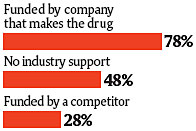You read that right. Apolcalypse is nigh.
For young women with a world of choices, even that monthly curse, the menstrual period, is optional.
Thanks to birth control pills and other hormonal contraceptives, a growing number of women are taking the path chosen by 22-year-old Stephanie Sardinha.
She hasn't had a period since she was 17.
"It's really one of the best things I've ever done," she says.
A college student and retail worker in Lisbon Falls, Maine, Sardinha uses Nuvaring, a vaginal contraceptive ring. After the hormones run out in three weeks, she replaces the ring right away instead of following instructions to leave the ring out for a week to allow bleeding. She says it has been great for her marriage, preventing monthly crankiness and improving her sex life.
"I would never go back," said Sardinha, who got the idea from her aunt, a nurse practitioner.
Using the pill or other contraceptives to block periods is becoming more popular, particularly among young women and those entering menopause, doctors say.
"I have a ton of young girls in college who are doing this," says Dr. Mindy Wiser-Estin, a gynecologist in Little Silver, N.J., who did it herself for years. "There's no reason you need a period."
Such medical jury-rigging soon will be unnecessary. Already, the Seasonale birth control pill limits periods to four a year. The first continuous-use birth control pill, Lybrel, likely will soon be on the U.S. market and drug companies are lining up other ways to limit or eliminate the period.
Most doctors say they don't think suppressing menstruation is riskier than regular long-term birth control use, and one survey found a majority have prescribed contraception to prevent periods. Women have been using the pill for nearly half a century without significant problems, but some doctors want more research on long-term use.










